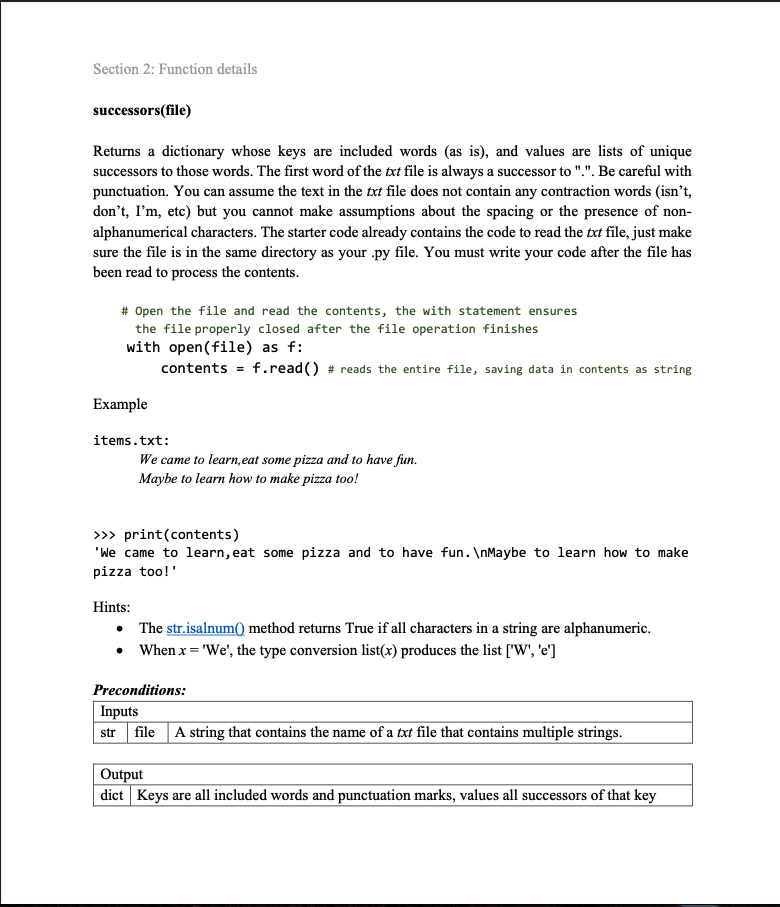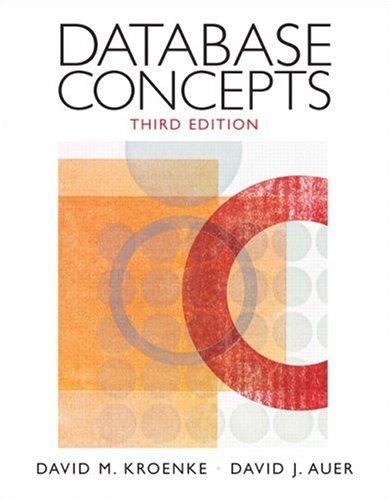Question
Starter Code def successors(file): >>> expected = {'.': ['We', 'Maybe'], 'We': ['came'], 'came': ['to'], 'to': ['learn', 'have', 'make'], 'learn': [',', 'how'], ',': ['eat'], 'eat':

Starter Code
def successors(file):
"""
>>> expected = {'.': ['We', 'Maybe'], 'We': ['came'], 'came': ['to'], 'to': ['learn', 'have', 'make'], 'learn': [',', 'how'], ',': ['eat'], 'eat': ['some'], 'some': ['pizza'], 'pizza': ['and', 'too'], 'and': ['to'], 'have': ['fun'], 'fun': ['.'], 'Maybe': ['to'], 'how': ['to'], 'make': ['pizza'], 'too': ['!']}
>>> returnedDict = successors('items.txt')
>>> expected == returnedDict
True
>>> returnedDict['.']
['We', 'Maybe']
>>> returnedDict['to']
['learn', 'have', 'make']
>>> returnedDict['fun']
['.']
>>> returnedDict[',']
['eat']
"""
with open(file) as f:
contents = f.read()
arr = []
This is an intro class, so please write this in a way that is easy to understand(if you're able to of course)
Thanks :)
Section 2: Function details successors(file) Returns a dictionary whose keys are included words (as is), and values are lists of unique successors to those words. The first word of the txt file is always a successor to ".". Be careful with punctuation. You can assume the text in the txt file does not contain any contraction words (isn't, don't, I'm, etc) but you cannot make assumptions about the spacing or the presence of non- alphanumerical characters. The starter code already contains the code to read the txt file, just make sure the file is in the same directory as your .py file. You must write your code after the file has been read to process the contents. # Open the file and read the contents, the with statement ensures the file properly closed after the file operation finishes with open(file) as f: contents = f.read() # reads the entire file, saving data in contents as string Example items.txt: We came to learn, eat some pizza and to have fun. Maybe to learn how to make pizza too! >>> print(contents) 'We came to learn, eat some pizza and to have fun. Maybe to learn how to make pizza too!' Hints: The str.isalnum() method returns True if all characters in a string are alphanumeric. When x='We', the type conversion list(x) produces the list ['W', 'e'] Preconditions: Inputs str file A string that contains the name of a txt file that contains multiple strings. Output dict Keys are all included words and punctuation marks, values all successors of that keyStep by Step Solution
There are 3 Steps involved in it
Step: 1

Get Instant Access to Expert-Tailored Solutions
See step-by-step solutions with expert insights and AI powered tools for academic success
Step: 2

Step: 3

Ace Your Homework with AI
Get the answers you need in no time with our AI-driven, step-by-step assistance
Get Started


